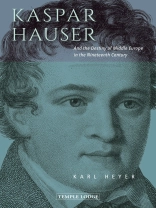Who was Kaspar Hauser and where did he come from? Why did he spend his childhood in a prison cell? Was he related to nobility, royalty or even Napoleon, as some have concluded?
From his appearance on the streets of Nuremberg in 1828 to his disturbing murder only five years later, the enigmatic story of Kaspar Hauser has stirred feelings of love and admiration in countless people. He has been celebrated as the subject of films and plays, popular books and academic studies, yet even today – almost two hundred years after his death – he continues to arouse opposition and hatred from his detractors, who dismiss him as an opportunist and a fraud.
In the first English-language edition of this classic text – the original, comprehensive attempt to illumine the mysterious life of Kaspar Hauser from a spiritual-scientific, anthroposophical perspective – historian Karl Heyer gathers the basic facts of the life and death of the ’Child of Europe’, exploring his remarkable abilities and character. With impressive clarity, he goes on to study Hauser’s fate in relation to the mission and destiny of Middle Europe, focusing on the roles of the House of Baden and key political actors such as Napoleon and Otto von Bismarck. His original research leads to some shattering conclusions with significant consequences for Europe’s future.
Heyer was initially drawn to the subject through a private conversation with Rudolf Steiner. That seed matured forty years later into intensive research and the first publication of this book in German in 1958. ’For me’, said Heyer, ’it represented the high point of my writing and a kind of crowning of my life’s work.’
Om författaren
KARL HEYER (1888–1964), lawyer and historian, was one of the foremost pupils of Rudolf Steiner. Born in Hanau (Hesse), he studied law in Kassel. In 1911, he heard a lecture by Rudolf Steiner and began an intensive study of history and philosophy, attaining his Ph D in 1917. Heyer worked actively in the movement for social threefolding, gave lectures and wrote essays and many books, including the nine-volume work Beiträge zur Geschichte des Abendlandes (‘Contributions to the History of the West’), which includes the present volume on Kaspar Hauser.












